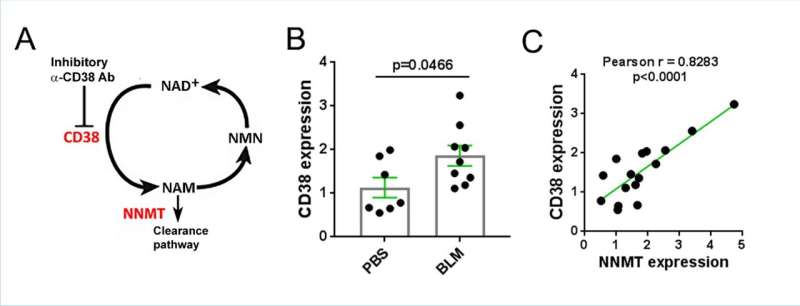This article has been reviewed according to Science X's editorial process and policies. Editors have highlighted the following attributes while ensuring the content's credibility:
fact-checked
peer-reviewed publication
trusted source
proofread
Antibody targeting CD38 enzyme shows positive impact in treating systemic sclerosis

Scleroderma is a chronic autoimmune disease of women. Over time, people living with scleroderma develop progressive and irreversible scarring. Scarring, called fibrosis, affects the lungs, heart and kidneys, leading to poor quality of life, disability and a reduced life expectancy. There is a significant unmet medical need for strategies that will slow, stop and reverse the fibrosis process.
To meet this need, doctors at the University of Michigan created a dedicated program that brings together clinicians, scientists and computational experts working as a team to provide advanced, comprehensive and personalized patient care to find solutions for scleroderma.
The Michigan team, led by John Varga, M.D., chief of the Division of Rheumatology, along with Eduardo Chini M.D., a professor at the Mayo Clinic, and Wim van Schooten, Ph.D., of TeneoBio, report promising results for a novel fibrosis treatment.
Based on the team's discovery that an enzyme called CD38, implicated in aging metabolism, is elevated in scleroderma and underlies fibrosis, they created an antibody engineered to selectively block the enzymatic activity of CD38.
A unique feature of the CD38 antibodies is that they are composed of heavy chains only, making them more selective, stable and distinct.
When tested in mice, these anti-CD38 inhibitory antibodies almost completely prevented scarring and inflammation in tissues. Antibody treatment also reversed metabolic abnormalities in the scleroderma model.
Interestingly, elevated CD38 had been linked previously to a variety of age-related conditions, cellular senescence and frailty, highlighting biological parallels of scleroderma with aging that point to a new direction for scleroderma research.
Building on these discoveries, the combined Michigan-Mayo team is now developing even more specific and safe CD38 inhibitors for the treatment of scleroderma.
"Targeting the CD38 enzyme is a very innovative concept that could be the next pharmacological approach for fibrosis treatment," said Varga, also the Frederick Huetwell Professor.
The findings are published in the journal Scientific Reports.
More information: Bo Shi et al, Heavy-chain antibody targeting of CD38 NAD+ hydrolase ectoenzyme to prevent fibrosis in multiple organs, Scientific Reports (2023). DOI: 10.1038/s41598-023-49450-1





















